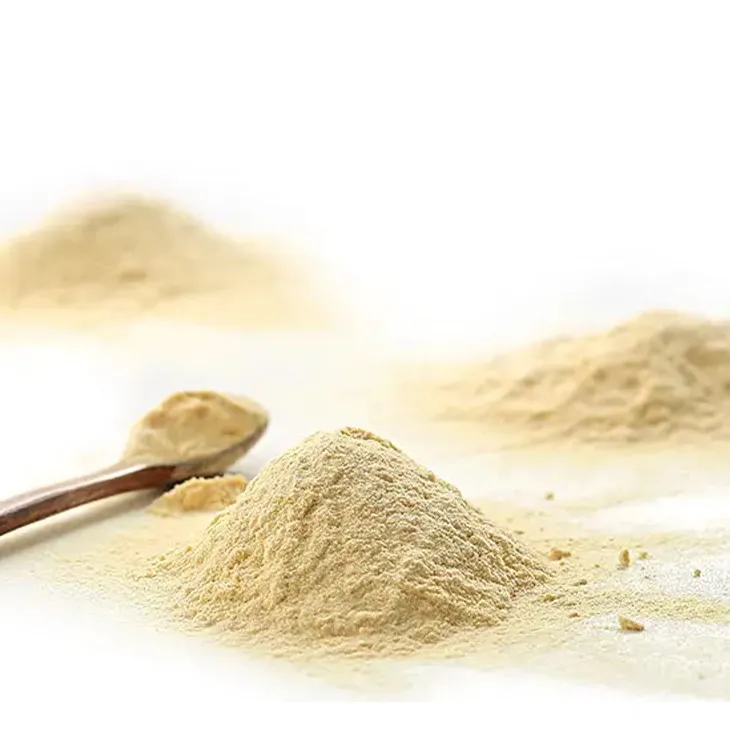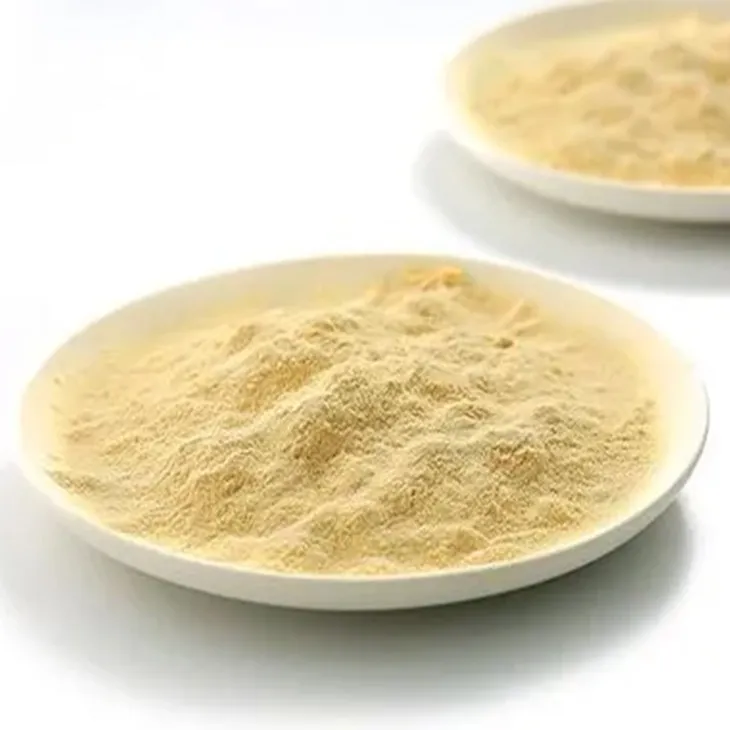- 0086-571-85302990
- sales@greenskybio.com
What is selenium yeast and why is it used on the skin?
2024-11-13

1. Introduction to Selenium yeast
Selenium yeast is a remarkable substance that has gained significant attention in various fields, including skincare. Selenium, an essential trace element, is incorporated into the yeast during a fermentation process. This results in a form of selenium that is more bioavailable and stable compared to other selenium sources.
Yeast, as a natural microorganism, serves as an excellent carrier for selenium. The combination of yeast and selenium creates a complex that can be easily incorporated into various products, especially those designed for topical application on the skin.

2. The Chemical Composition of Selenium yeast
Selenium yeast contains a variety of organic selenium compounds. These compounds are mainly selenomethionine and selenocysteine, which are analogs of the amino acids methionine and cysteine, respectively.
Selenomethionine is the predominant form of selenium in selenium yeast. It is incorporated into proteins in a non - specific manner during protein synthesis in the yeast. This form of selenium is stable and can be stored in the body for a longer period.
Selenocysteine, on the other hand, is a unique amino acid that contains selenium. It is involved in the synthesis of specific selenoproteins, which play crucial roles in various biological processes. In selenium yeast, the presence of both selenomethionine and selenocysteine contributes to its overall efficacy.

3. Selenium and Skin Health
3.1. Antioxidant Properties
One of the main reasons selenium yeast is used on the skin is its powerful antioxidant properties. The skin is constantly exposed to environmental stressors such as ultraviolet (UV) radiation, pollution, and free radicals generated from normal metabolic processes.
Selenium is an essential component of antioxidant enzymes, such as glutathione peroxidase. These enzymes play a vital role in neutralizing free radicals. Free radicals are highly reactive molecules that can damage cells, including skin cells. By neutralizing free radicals, selenium helps to prevent oxidative damage to the skin.
For example, UV radiation from the sun can generate a large number of free radicals in the skin. These free radicals can cause damage to DNA, proteins, and lipids in skin cells. Selenium - containing antioxidant enzymes can scavenge these free radicals, reducing the risk of skin damage, such as sunburn, premature aging, and an increased risk of skin cancer.
3.2. Anti - Inflammatory Effects
Inflammation is a common response of the skin to various stimuli, including infections, allergens, and physical trauma. Chronic inflammation can lead to a variety of skin problems, such as acne, eczema, and psoriasis.
Selenium has been shown to have anti - inflammatory effects on the skin. It can modulate the immune response in the skin, reducing the production of inflammatory cytokines. These cytokines are signaling molecules that play a key role in the inflammatory process.
For instance, in acne, inflammation is a major factor contributing to the development of pimples and pustules. Selenium yeast can help to reduce the inflammation associated with acne, promoting the healing of the skin and reducing the severity of acne lesions.
4. How Selenium Yeast Protects the Skin from Environmental Damage
The environment poses numerous threats to the skin. Pollution, in particular, contains a variety of harmful substances, such as particulate matter, heavy metals, and chemicals. These pollutants can penetrate the skin and cause damage at the cellular level.
Selenium yeast helps to protect the skin from environmental damage in several ways. Firstly, as mentioned earlier, its antioxidant properties enable it to neutralize free radicals generated by environmental pollutants. Secondly, selenium can enhance the skin's barrier function.
The skin barrier is composed of lipids and proteins that prevent the entry of harmful substances and the loss of moisture from the skin. Selenium can promote the synthesis of lipids and proteins in the skin, strengthening the skin barrier. This helps to keep pollutants out and maintain the skin's hydration and integrity.
5. Selenium Yeast and Skin Aging
Skin aging is a complex process that is influenced by both internal and external factors. External factors, such as UV radiation and pollution, accelerate the aging process, leading to the appearance of wrinkles, fine lines, and loss of skin elasticity.
Selenium yeast can play a significant role in combating skin aging. Its antioxidant and anti - inflammatory properties help to prevent and repair the damage caused by external factors. By reducing oxidative stress and inflammation, selenium yeast can slow down the breakdown of collagen and elastin in the skin.
Collagen and elastin are two important proteins that provide structural support to the skin. As we age, the production of these proteins decreases, and their degradation increases. Selenium yeast can help to maintain the levels of collagen and elastin in the skin, keeping it firm and elastic and reducing the appearance of wrinkles.
6. The Use of Selenium Yeast in Skincare Products
6.1. Cleansers
Selenium yeast can be incorporated into cleansers. Cleansers are used to remove dirt, oil, and makeup from the skin. Selenium - containing cleansers can provide additional benefits beyond basic cleansing.
While cleansing the skin, they can also deliver selenium to the skin, which can then start to exert its antioxidant and anti - inflammatory effects. This is especially beneficial for people with oily or acne - prone skin, as selenium can help to control sebum production and reduce inflammation.
6.2. Moisturizers
In moisturizers, selenium yeast can enhance the overall effectiveness of the product. Moisturizers are designed to hydrate the skin and prevent moisture loss. Selenium can strengthen the skin barrier, as mentioned before, which helps to keep the skin hydrated for a longer period.
Additionally, the antioxidant properties of selenium can protect the skin from damage during the day, even when the moisturizer is on the skin. This makes selenium - containing moisturizers a great option for those looking to improve the health and appearance of their skin.
6.3. Serums
Serums are highly concentrated skincare products that are designed to target specific skin concerns. Selenium yeast - containing serums can be formulated to address issues such as oxidative stress, skin aging, and inflammation.
These serums can penetrate deeper into the skin compared to other products, delivering a high dose of selenium and other active ingredients directly to the areas where they are needed most. This can result in more visible and faster - acting results in improving skin health.
7. Safety and Precautions of Using Selenium Yeast on the Skin
While selenium yeast is generally considered safe for use on the skin, there are some precautions to be taken. Some people may be allergic to yeast or selenium, and in such cases, using products containing selenium yeast can cause allergic reactions.
It is important to do a patch test before using a new product containing selenium yeast. Apply a small amount of the product to a small area of the skin, such as the inside of the forearm, and wait for 24 - 48 hours to see if any redness, itching, or swelling occurs.
Also, excessive use of selenium - containing products may lead to an over - accumulation of selenium in the body. Although this is rare when used topically, it is still something to be aware of. The recommended usage levels should be followed to ensure safety.
8. Conclusion
Selenium yeast is a valuable ingredient in skincare. Its unique chemical composition, rich in organic selenium compounds, provides multiple benefits to the skin. From its antioxidant and anti - inflammatory properties to its ability to protect the skin from environmental damage and combat skin aging, selenium yeast has a lot to offer.
When used in various skincare products such as cleansers, moisturizers, and serums, it can enhance the overall effectiveness of these products. However, like any skincare ingredient, proper safety precautions should be taken to ensure its safe and effective use on the skin.
FAQ:
What is selenium yeast?
Selenium yeast is a form in which selenium is incorporated into yeast cells during the yeast's growth process. It is a rich source of selenium, an essential trace element for the human body.
How does selenium yeast combat oxidative stress on the skin?
Selenium is a powerful antioxidant. In selenium yeast, selenium can help neutralize free radicals on the skin. Free radicals are unstable molecules that can damage skin cells and lead to premature aging and various skin problems. By scavenging these free radicals, selenium yeast helps combat oxidative stress and protect the skin's integrity.
What kind of environmental damage can selenium yeast protect the skin from?
It can protect the skin from environmental pollutants such as ultraviolet (UV) radiation, smog, and chemical pollutants. UV radiation can cause DNA damage, inflammation, and photo - aging in the skin. Selenium yeast may enhance the skin's defense mechanisms against these harmful environmental factors.
How does selenium yeast promote a healthy complexion?
By reducing oxidative stress and protecting from environmental damage, selenium yeast helps maintain the normal function of skin cells. It may also play a role in collagen synthesis and skin cell regeneration, which are crucial for a smooth, firm, and radiant complexion.
Is selenium yeast safe to use on the skin?
When used appropriately, selenium yeast is generally considered safe for skin use. However, as with any skincare ingredient, some individuals may be allergic or sensitive to it. It is advisable to do a patch test before widespread use on the skin.
Related literature
- The Role of Selenium in Skin Health"
- "Selenium Yeast: A Promising Ingredient for Skin Protection"
- "Beneficial Effects of Selenium on Skin Against Oxidative Stress"
- ▶ Hesperidin
- ▶ citrus bioflavonoids
- ▶ plant extract
- ▶ lycopene
- ▶ Diosmin
- ▶ Grape seed extract
- ▶ Sea buckthorn Juice Powder
- ▶ Beetroot powder
- ▶ Hops Extract
- ▶ Artichoke Extract
- ▶ Reishi mushroom extract
- ▶ Astaxanthin
- ▶ Green Tea Extract
- ▶ Curcumin Extract
- ▶ Horse Chestnut Extract
- ▶ Other Problems
- ▶ Boswellia Serrata Extract
- ▶ Resveratrol Extract
- ▶ Marigold Extract
- ▶ Grape Leaf Extract
- ▶ blog3
- ▶ blog4
- ▶ blog5
-
Organic Tongkat Ali extract powder factory.
2024-11-13
-
How to make powder with ashwagandha extract.
2024-11-13
-
Rosehip extract manufacturers from China.
2024-11-13
-
The best cat's claw extract in nature.
2024-11-13
-
Chinese Dandelion Leaf Extract Suppliers.
2024-11-13
-
Almond Extract Powder
2024-11-13
-
Apricot Powder
2024-11-13
-
Bamboo Leaf extract
2024-11-13
-
Horse Chestnut Extract
2024-11-13
-
Hericium erinaceus extract powder
2024-11-13
-
Panax Ginseng Leaf Extract
2024-11-13
-
White Willow Bark Extract
2024-11-13
-
Ivy Extract
2024-11-13
-
Uridine-5'-monophosphate Disodium salt
2024-11-13
-
Bayberry Extract
2024-11-13





















